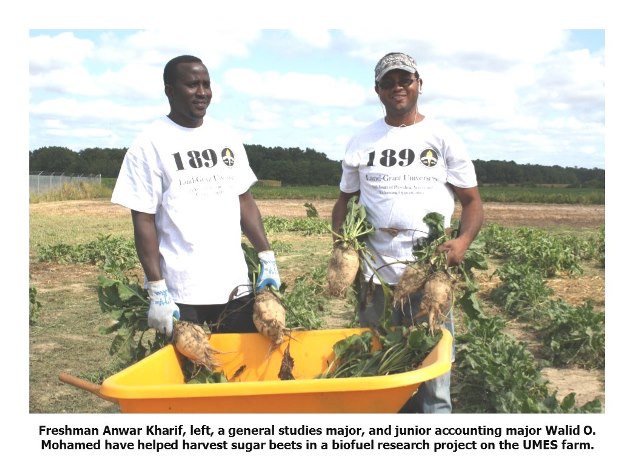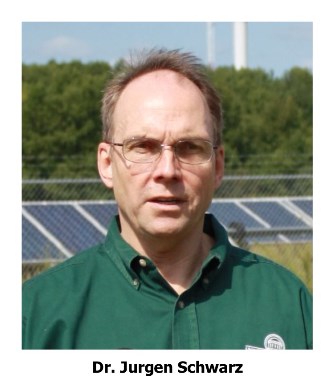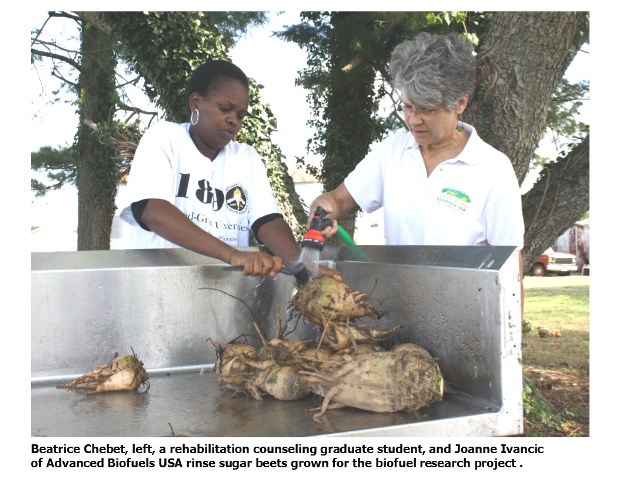
Friday, October 21, 2016
PRINCESS ANNE, MD – (Oct. 21, 2016) – A team of researchers that includes UMES agriculture, food and resource sciences professors is scratching the surface of a new frontier searching for alternatives to fossil fuels that power combustion engines.
Actually, that frontier is eight-to-12 inches below the surface of a fifth of an acre in the shadow of the university’s solar panel energy grid on the east side of campus.
Jurgen Schwarz, chairman of the university’s Department of Agriculture, Food and Resource Sciences, and colleagues Arthur Allen and Caleb Nindo are working with a consortium of private-sector partners focused on finding new sources of biofuels by planting sugar beets.
“Energy beets,” Schwarz likes to call them.
Early findings show the beets appear capable of producing two-to-three times more ethanol than a comparable amount of corn, which heretofore has been the primary source of the alternative fuel.
And the beets apparently thrive in soil that contains phosphorus, a compound in chicken waste used for generations as fertilizer that bedevils the Delmarva Peninsula’s environment and economy, and has been a focus of Allen’s research at UMES for many years.
“Our preliminary findings are extremely encouraging,” Schwarz said.
Working with Advanced Biofuels USA, an education non-profit and Atlantic Biomass LLC, both in Frederick, Md., and Plant Sensory Systems, a Baltimore-based commercial seed company, Schwarz, his colleagues and graduate students designed a field experiment tracking the many variables affecting agriculture, including soil conditions, disease, weed infestation and the optimum growing season.
The beet plot experiment at UMES, which features 25 varieties of the root plant, was funded by a $16,893 grant Advanced Biofuels’ Joanne Ivancic procured from the U.S. Department of Agriculture’s Rural Development Office. Also involved are the federal departments of Energy and Transportation as well as the U.S. Navy and Purdue University in Indiana as a research partner.
Long range, Ivancic and Robert Kozak, Atlantic Biomass’ president, envision sugar beets as a viable source of more environmentally friendly, less-costly methods of producing aviation fuel that could reduce reliance on petroleum.
The U.S. Navy, in particular, Kozak noted, has “taken the lead on proving it works.”
“Hopefully, this (research) will take it from seed to airplane,” Ivancic said.
Starting in mid-August, the research team began harvesting designated rows of beets every 30 days, carefully rinsing and weighing them before slicing them and running them through a blender to extract ingredients that could be converted to ethanol. Some beets are as large as pineapples.

Schwarz is uncertain whether beets that purposefully will remain in the ground until mid- November will survive and produce what researchers are looking for in terms of yield.
“That’s what we do when we set up experiments like this,” Schwarz said. “We try to measure as many variables as we can to get optimal results.”
As a researcher at a land-grant university, Schwarz is experiencing a bit of déjà vu. He was raised on a farm in Germany, where his family had a contract to grow beets that were in turn sold to a local factory, which converted them into sugar.
Sugar beets are not grown commercially on lower Delmarva, as far as Schwarz knows. Should the experiment result in promising indicators in terms of cost and yield, the root crops someday just might emerge as an alternative cash crop.
“We still have a long way to go before we can say that is where this might be headed,” he said.
Experimental projects involving sugar beets also are taking place in other locations around the country to gauge where ideal growing conditions might be. Delmarva, so far, appears to be capable of producing favorable results.
Preliminary findings at UMES, Kozak said, indicate beets appear capable of producing 860-to-900 gallons of ethanol per acre; the target is 1,000 gallons.

That’s where Kathleen Turano’s company, Plant Sensory Systems, comes in. She and her husband Frank are working to identify the right species of sugar beets to fit Delmarva’s growing conditions. She said the UMES plot trials have been encouraging.
UMES’ research team will spend the coming months reviewing its findings and compiling a report that might lay the groundwork in helping local farmers make decisions about future crops to grow.
It turns out dried beet pulp and other leftover material from the plant make nutritious livestock feed, Schwarz said.
The research partners are hopeful results from the initial USDA grant can be parlayed into additional research funding to expand the project and conduct more detailed experiments.
From the perspective of a land-grant institution, Schwarz said the partnership has provided learning and research opportunities that someday might produces benefits for agriculture and the local economy.
UMES Office of Public Relations; (410) 651-6669

